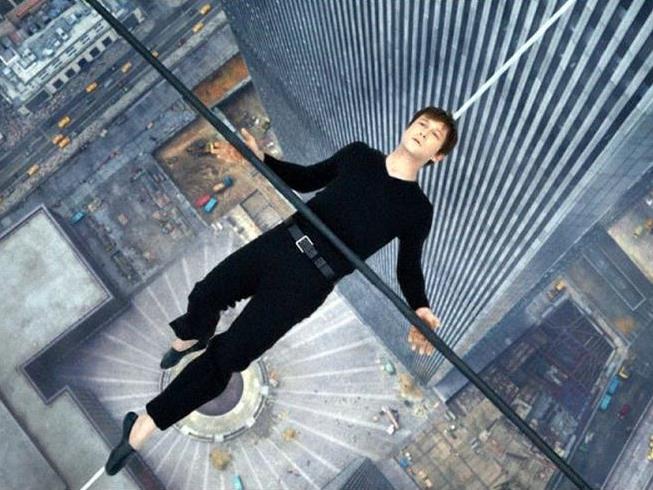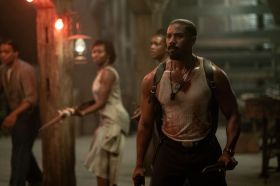When James Marsh (The Theory of Everything) scaled the heights of the filmmaking world, he did so by following the footsteps of Philippe Petit. With 2008’s Man on Wire, the British director charted the exploits of the French high-wire artist, earning the Academy Award for best documentary in the process. Marsh’s movie crafted a chronicle not only of his subject’s 1974 walk across a cable suspended between the World Trade Centre, but of the peaks the combination of wonder and perseverance could scale. It is far from surprising that others would be inspired to take his lead.
Now, in The Walk, writer/director Robert Zemekis (Flight) ventures to the top of the iconic structure to recreate Petit’s claim to fame. The central figure, in the guise of actor Joseph Gordon-Levitt (Sin City: A Dame to Kill For), narrates his journey from street performer to daredevil from atop the Statue of Liberty, relating the adventure that stemmed from spying an image of the buildings he would try to conquer in a magazine. After this turning point in his quest for high-altitude fulfilment, mentorship under Papa Rudy (Ben Kingsley, Life) and a romance with Annie (Charlotte Le Bon, The Hundred-Foot Journey) aid his endeavour, as does the assistance of a team of American accomplices (including Week-ends’ César Domboy, A Christmas Carol‘s Steve Valentine, Parkland’s James Badge Dale, The Interview‘s Ben Schwartz and The Beautiful Lie‘s Benedict Samuel). Following months of planning, Petit would step into to 61-metre gap and into the history books.
Though Petit’s book To Reach the Clouds provides Zemekis and first-time feature co-scribe Christopher Browne with The Walk’s basis, the movie sits in a very large shadow that it just can’t shake. The shape and form of Man on Wire looms large over the live-action account of the same events, particularly when compiled in the same fashion as a pseudo-heist film. That the feature finds its high point when its protagonist reaches his is no mere coincidence, nor does it reflect a screenplay that’s labourious and clunky. Instead, reaching up into the clouds proves The Walk‘s most engaging element simply because it provides the crux of its 3D-enhanced visual showcase.
In bad news for audience members suffering from vertigo — but good news for those looking for a spectacle — the simulation of Petit’s strolls between the Twin Towers revel in their position 417 metres above the ground. Once Zemekis climbs to the top of the famous building with cinematographer Dariusz Wolski (The Martian), he favours a swooping, hovering bird’s eye view, and consequently misses no opportunity to impart a sense of wonder into proceedings. The filmmaker adopts the same transporting, showman-like approach in heightening the drama of his re-enactment, daring viewers to believe that every foot Gordon-Levitt places on the wire strung up high is going to stumble, even if history dictates otherwise. Tension radiates, as does immersion — though the contrast between this engaging third act and all that precedes it is stark and ever apparent.
The stunning effectiveness of the imagery during the titular walk does attempt to redress the areas where the film is found lacking elsewhere, such as its standard standing otherwise. In a slow-building offering that leaves ample room for more than cursory character development, Gordon-Levitt’s performance never threatens to peel back the layers of Petit’s single-minded pursuit of his dream beyond the clear need to prove himself in the wake of an unsupportive father, and his French accent is troubling to listen to, as is the cartoonish Kingsley’s. That the lead actor fares best with summoning an element the feature otherwise struggles with — a sense of playfulness and whimsy — is emblematic of the awkward manner in which much of the movie struggles in its clashing pursuit of telling an astonishing true story already told better before and presenting stunning cinematic sights. A more favourable reading of The Walk could find parallels in the bliss the scenic saunter eventually offers those watching and the respite from disappointment it affords the man brave enough to try such a feat, but little is done to earn that optimistic view in the former circumstance, unlike the latter.
Rating: 2.5 stars out of 5
The Walk
Director: Robert Zemekis
USA, 2015, 123 mins
Release date: October 15
Distributor: Sony
Rated: PG
Actors:
Director:
Format:
Country:
Release:





